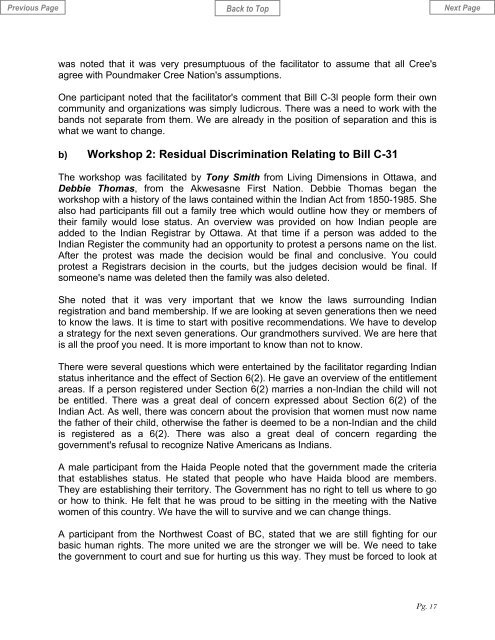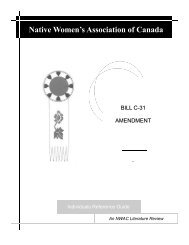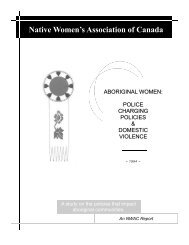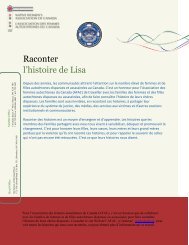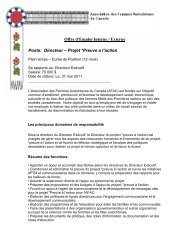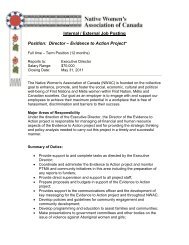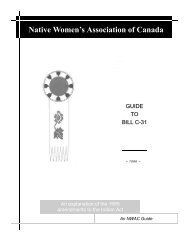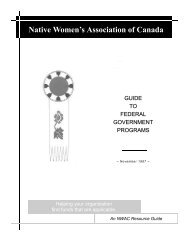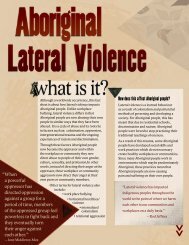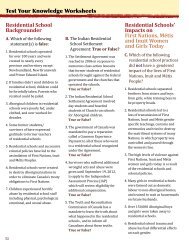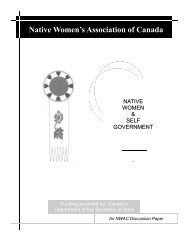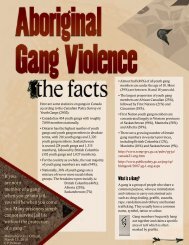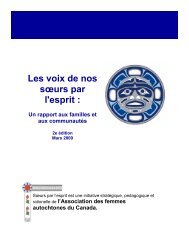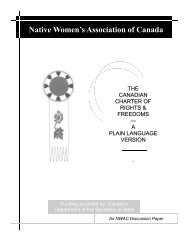BILL C-31 - Native Women's Association of Canada Website
BILL C-31 - Native Women's Association of Canada Website
BILL C-31 - Native Women's Association of Canada Website
- No tags were found...
Create successful ePaper yourself
Turn your PDF publications into a flip-book with our unique Google optimized e-Paper software.
was noted that it was very presumptuous <strong>of</strong> the facilitator to assume that all Cree'sagree with Poundmaker Cree Nation's assumptions.One participant noted that the facilitator's comment that Bill C-3l people form their owncommunity and organizations was simply ludicrous. There was a need to work with thebands not separate from them. We are already in the position <strong>of</strong> separation and this iswhat we want to change.b) Workshop 2: Residual Discrimination Relating to Bill C-<strong>31</strong>The workshop was facilitated by Tony Smith from Living Dimensions in Ottawa, andDebbie Thomas, from the Akwesasne First Nation. Debbie Thomas began theworkshop with a history <strong>of</strong> the laws contained within the Indian Act from 1850-1985. Shealso had participants fill out a family tree which would outline how they or members <strong>of</strong>their family would lose status. An overview was provided on how Indian people areadded to the Indian Registrar by Ottawa. At that time if a person was added to theIndian Register the community had an opportunity to protest a persons name on the list.After the protest was made the decision would be final and conclusive. You couldprotest a Registrars decision in the courts, but the judges decision would be final. Ifsomeone's name was deleted then the family was also deleted.She noted that it was very important that we know the laws surrounding Indianregistration and band membership. If we are looking at seven generations then we needto know the laws. It is time to start with positive recommendations. We have to developa strategy for the next seven generations. Our grandmothers survived. We are here thatis all the pro<strong>of</strong> you need. It is more important to know than not to know.There were several questions which were entertained by the facilitator regarding Indianstatus inheritance and the effect <strong>of</strong> Section 6(2). He gave an overview <strong>of</strong> the entitlementareas. If a person registered under Section 6(2) marries a non-Indian the child will notbe entitled. There was a great deal <strong>of</strong> concern expressed about Section 6(2) <strong>of</strong> theIndian Act. As well, there was concern about the provision that women must now namethe father <strong>of</strong> their child, otherwise the father is deemed to be a non-Indian and the childis registered as a 6(2). There was also a great deal <strong>of</strong> concern regarding thegovernment's refusal to recognize <strong>Native</strong> Americans as Indians.A male participant from the Haida People noted that the government made the criteriathat establishes status. He stated that people who have Haida blood are members.They are establishing their territory. The Government has no right to tell us where to goor how to think. He felt that he was proud to be sitting in the meeting with the <strong>Native</strong>women <strong>of</strong> this country. We have the will to survive and we can change things.A participant from the Northwest Coast <strong>of</strong> BC, stated that we are still fighting for ourbasic human rights. The more united we are the stronger we will be. We need to takethe government to court and sue for hurting us this way. They must be forced to look atPg. 17


